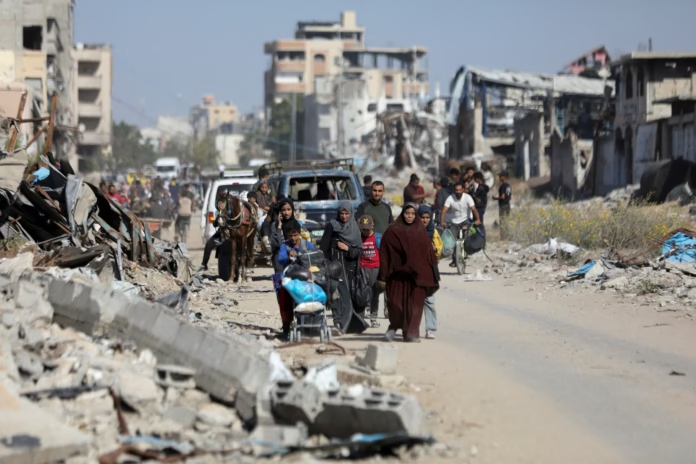Israeli and Hamas delegations are expected in Cairo on Sunday for negotiations aimed at ending nearly two years of war in Gaza, as hopes rose for a deal that could see hostages released within days.
The talks follow Hamas’ positive response to US President Donald Trump’s proposed roadmap, which links the release of captives to the freeing of hundreds of Palestinians held in Israeli prisons.
Israeli Prime Minister Benjamin Netanyahu said on Saturday that he had instructed his team to travel to Egypt “to finalise the technical details.” Egyptian authorities confirmed that they would also host a Hamas delegation to discuss “the ground conditions and details of the exchange of all Israeli detainees and Palestinian prisoners.”
Egyptian state-linked media reported that indirect negotiations between the two sides would take place on Sunday and Monday, just before the second anniversary of the October 7 Hamas attack that triggered the conflict.
The White House said Trump had dispatched two envoys to Egypt — his son-in-law Jared Kushner and Middle East negotiator Steve Witkoff.
Trump warned Hamas against stalling, saying he would “not tolerate delay,” and urged the group to agree swiftly to the proposal “or else all bets will be off.” He said Israel had approved an initial withdrawal line in Gaza and that this had been shared with Hamas.
“When Hamas confirms, the Ceasefire will be IMMEDIATELY effective, the Hostages and Prisoner Exchange will begin, and we will create the conditions for the next phase of withdrawal,” Trump wrote on Truth Social, alongside a map of the plan.
Netanyahu said in a televised address that he expected “in the coming days we will be able to bring back all our hostages… during the Sukkot holidays,” which begin Monday. He added that “Hamas will be disarmed… either diplomatically via Trump’s plan or militarily by us.”
Hamas announced on Friday that it had agreed to the release of all hostages — both the living and the remains — based on the exchange formula in Trump’s proposal. Trump immediately welcomed the move, saying it showed the group was “ready for a lasting PEACE” and urged Israel to halt its bombing campaign.
Despite the call for a pause, Israeli strikes on Gaza continued through the weekend. AFPTV footage on Sunday showed thick smoke rising above the territory.
Gaza’s civil defence agency said at least five people were killed in Israeli strikes on Gaza City in the morning, with several attacks overnight. On Saturday, nearly 60 people were reported killed, including 40 in Gaza City alone.
The Israeli military said its operations in Gaza City were ongoing and warned residents not to return, describing it as “extremely dangerous.”
Mahmud al-Ghazi, 39, from Gaza City’s Al-Rimal neighbourhood, said the bombardment had intensified. “Israel has actually escalated its attacks since Trump’s call for a pause. Who will stop Israel now? We need the negotiations to move faster to stop this genocide and the ongoing bloodshed.”
Hamas, in its response to the Trump plan, insisted it must have a role in Gaza’s future. The proposal outlines a ceasefire, the release of hostages within 72 hours, Hamas’s disarmament, and a phased Israeli withdrawal. It also states that Hamas and other factions will not take part in post-war governance, which would be handled by a technocratic administration overseen by a transitional authority led by Trump himself.
“Netanyahu will not be able to escape this time… (Trump) is the only one who can force Israel to comply and stop the war,” said Sami Adas, 50, who lives in a tent with his family in Gaza City.
Hamas’s October 7, 2023 attack killed 1,219 people, mostly civilians, according to Israeli figures. Israel’s military response has killed at least 67,074 Palestinians, according to Gaza’s health ministry, whose data the United Nations considers reliable. The figures do not separate civilians from fighters but show that more than half of the dead are women and children.

